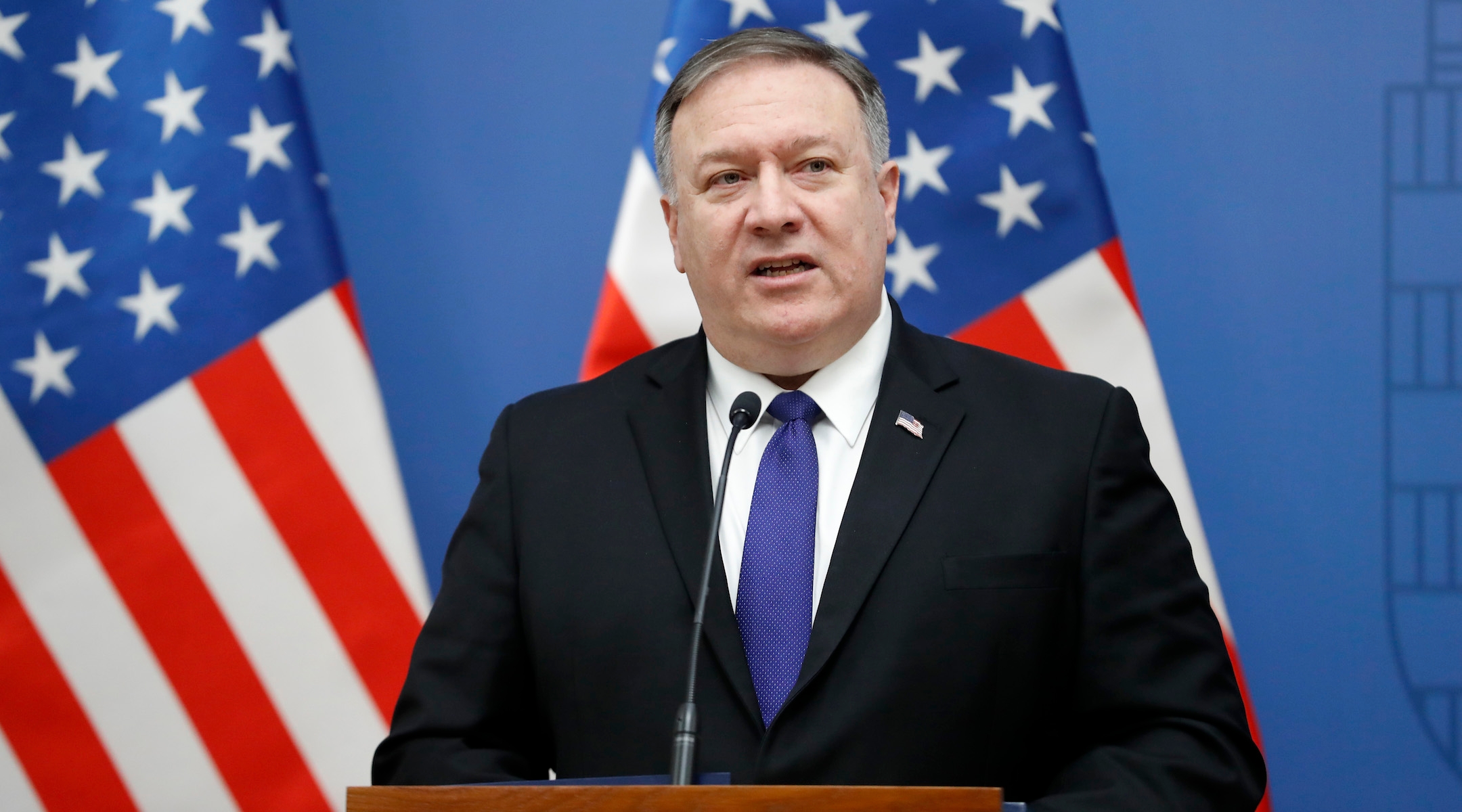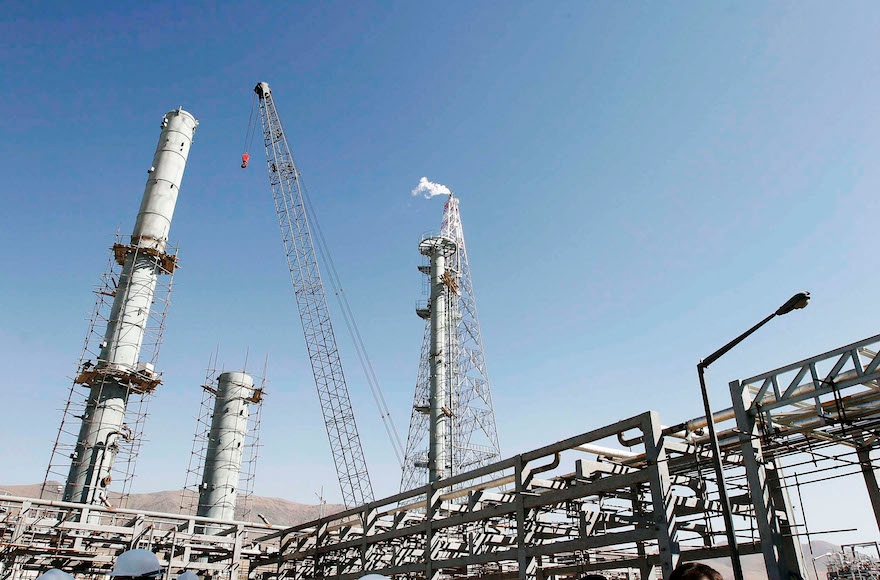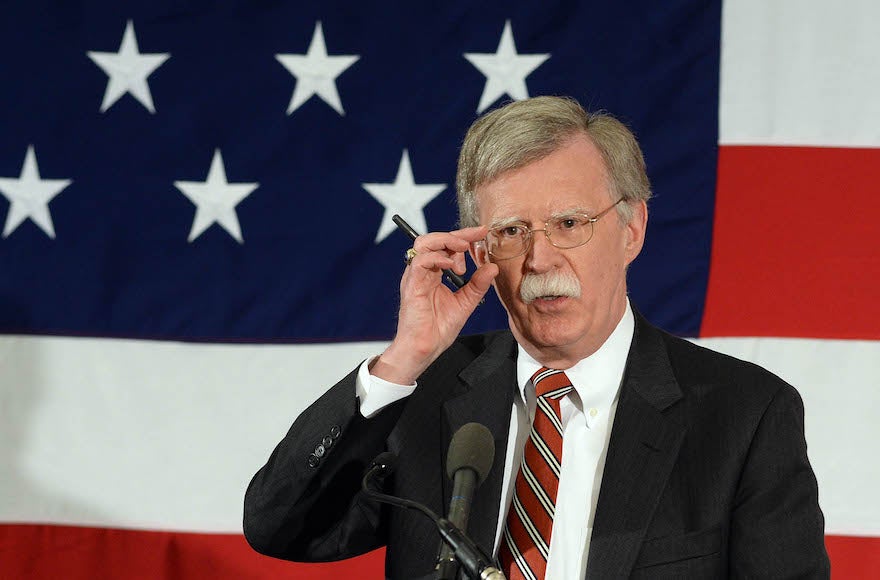Is the Trump administration sending mixed signals on the Iran deal?
Published May 10, 2019
WASHINGTON (JTA) – Iran announced this week that it is changing a key term of the Iran nuclear deal — and plans to make an even more dramatic change in 60 days if partners don’t ease conditions.
The partners — Europe chief among them — complained, loudly. But so did an ex-partner: the United States.
The Trump administration immediately retaliated, expanding sanctions on Iran after Tehran said it would fiddle with a deal that the Trump administration thinks should be null and void.
“Hey, this is binary. You’re either in compliance or you’re not,” Secretary of State Mike Pompeo said in Baghdad on Tuesday, a day before Iranian President Hassan Rouhani announced the change, and at the same time that the Trump administration was celebrating the one-year anniversary of pulling out of the deal. (Reports of Rouhani’s planned announcement had already emerged.)
Pompeo’s statements sound a little confusing to observers who have followed the Trump administration’s stance on the deal. Trump has called the agreement the “worst” deal ever.
So what’s going on?

Secretary of State Mike Pompeo at a news conference with with Hungarian Foreign Minister Peter Szijjarto at the foreign ministry in Budapest, Feb. 11, 2019. (Laszlo Balogh/Getty Images)
The answer is that the Trump administration sees Iran’s behavior as another instance of why it pulled the U.S. out of the deal in the first place: The Iranian regime is not trustworthy.
“Cheating just a little bit is still cheating. And in the context of Iran’s nuclear commitments, it will not be tolerated,” Brian Hook, the State Department’s special representative for Iran, said Wednesday at the Center for Strategic and International Studies. “If the clerics in Tehran choose, as the Iranian people are demanding, to play by the rules, respect the sovereignty of their neighbors, and abide by international obligations and commitments, the United States will be ready and willing to engage.”
What Iran is planning: Under the 2015 deal, Iran was permitted to enrich uranium for peaceful medical research purposes but was required to sell its surplus. Iran is now immediately keeping its surplus low-enriched uranium, which it had sold overseas. Low enriched uranium may be repurposed to make nuclear weapons. In 60 days, unless its partners take steps to ease its economic isolation, Iran has threatened to remove caps on uranium enrichment levels and resume work on its Arak plutonium nuclear facility.
How the Trump administration reacted: It added new sanctions on Iran’s metals sector, on top of sanctions already on Iran’s financial and energy sectors.
How partners to the deal reacted: The European Union and three signatories to the deal, Britain, France and Germany, demanded Iran to stick to the deal and urged the United States to butt out.
“We regret the re-imposition of sanctions by the United States following their withdrawal from the JCPOA,” a joint statement said, using the acronym for the deal’s name, the Joint Comprehensive Plan of Action. “We call on countries not party to the JCPOA to refrain from taking any actions that impede the remaining parties’ ability to fully perform their commitments.”
Russia and China, the other parties to the deal, are equally as committed to making it work.

Iran’s controversial heavy water production facility is seen in this general view at Arak, south of the Iranian capital Tehran, Oct. 27, 2004. (Saeedi/Getty Images)
What the Trump administration wants: They want the deal to collapse and for Iran to acquiesce to its demands that it end all nuclear activity; that Iran stop producing ballistic missiles; that it stop interfering in the region and elsewhere (the United States sees Iran’s malign hand in Yemen, Iraq and Syria, and as far afield as Venezuela); and that it improve human rights for its citizens.
Is the pressure working? The Trump administration thinks so.
“For the first time in a very long time, we are raising the costs of Iran’s expansionism and making clear that this kind of blackmail will no longer work,” Hook said. “We are making it unsustainable for Iran to support terrorist proxies and militias that for decades have defied the basic standards of behavior observed by normal countries.”
He listed, among other consequences, the effective expulsion of Iran from the SWIFT international financial messaging system and the admission by Hezbollah, Iran’s ally in Lebanon, that it is starved for cash.
The other partners to the deal are committed to resisting the pressure, and the Europeans are pressing ahead with plans to set up a complex barter system, INSTEX, that would work around the U.S. sanctions.

John Bolton speaking at the First in the Nation Republican Leadership Summit in Nashua, N.H., April 17, 2015. (Darren McCollester/Getty Images)
What happens next? Someone blinks. John Bolton, Trump’s national security adviser, last week announced the deployment of extra forces to the region to counter what the United States says is Iran’s heightened menace. He cited, but did not define, “troubling and escalatory indications and warnings” from Iran.
Trump, reportedly wary of Bolton’s overseas interventionism, might want to replicate his direct overtures to North Korea by talking directly with Iran. (No predecessor ever did: The Obama administration stuck to multilateral talks.)
“What I’d like to see with Iran, I’d like Iran to call me,” he said Thursday at a White House briefing with reporters on planned reforms to medical billing.















